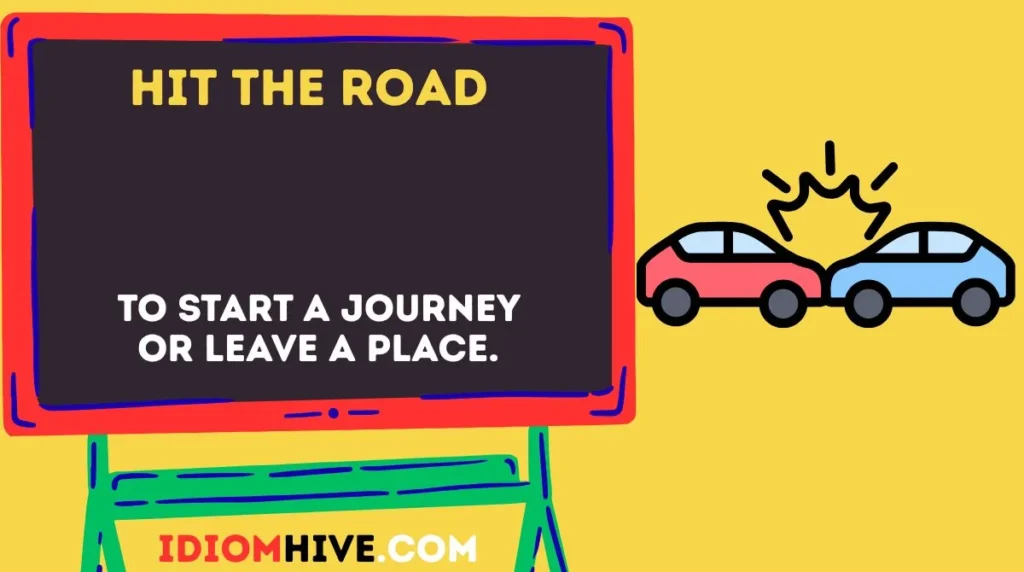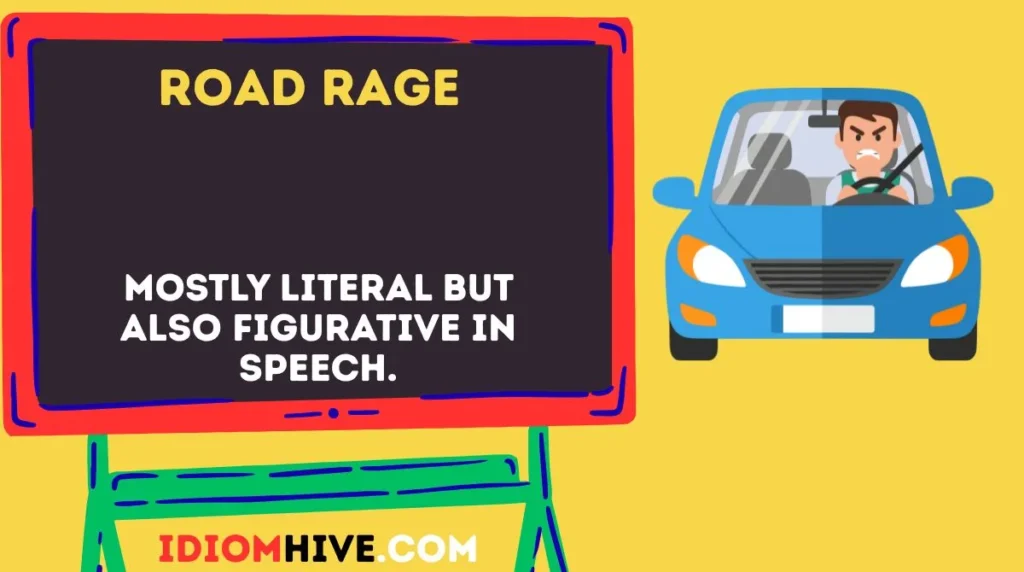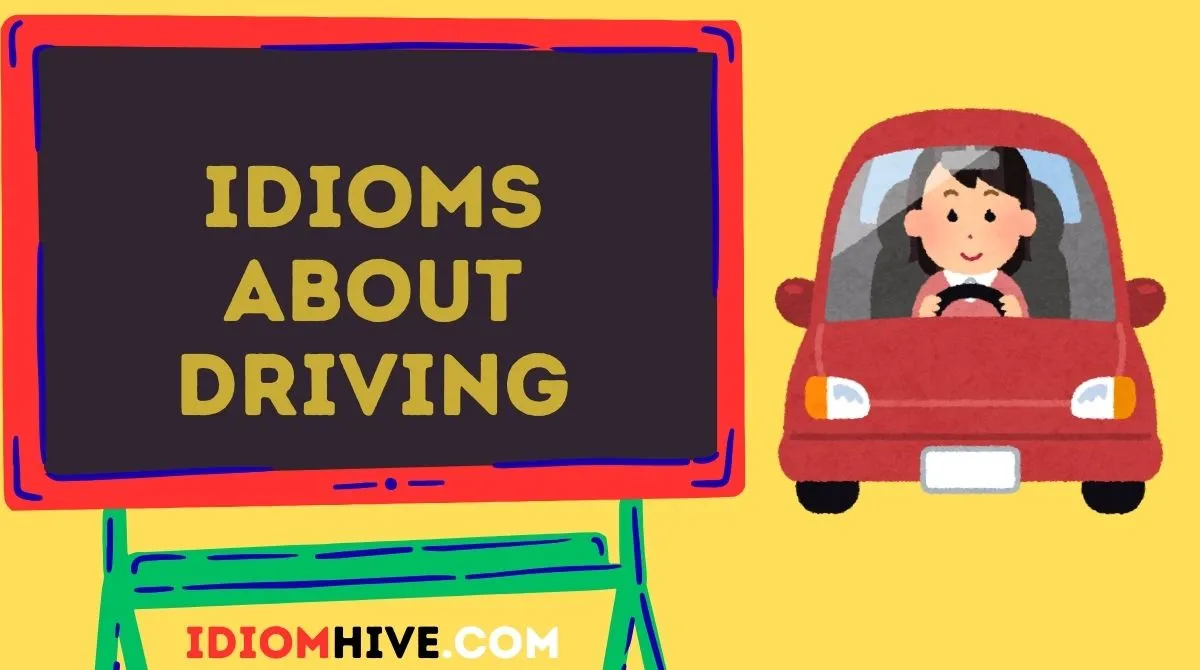Language becomes more lively and expressive when we use idioms. Idioms are phrases where the meaning is not exactly what the words say, but something deeper or symbolic.
For example, “hit the road” does not literally mean hitting the ground but starting a journey. Idioms are widely used in English because they make conversations, writing, and even storytelling more engaging and natural.
When it comes to driving, English is full of idioms inspired by cars, roads, and traffic. Since driving is such a big part of everyday life, these idioms are not only useful when talking about vehicles but also when describing situations in life, careers, and relationships.
By learning idioms about driving, you will understand native speakers better and also sound more fluent when you speak or write English.
Did You Know?
The first recorded driving-related idioms started appearing in English during the 19th century, when cars were first invented. Over time, people connected the experience of being on the road to life’s challenges. That’s why today we say things like “life is a highway” or “in the driver’s seat” to describe control, journeys, and progress.
Idioms About Driving and Journeys
Hit the road

Meaning: To start a journey or leave a place.
Example: “It’s getting late, we should hit the road before it gets dark.”
Similar Idiom: Get going.
Note: Common in daily speech, informal but very natural.
On the road
Meaning: Traveling, often for work or leisure.
Example: “She’s been on the road for two weeks promoting her new book.”
Similar Idiom: Away traveling.
Note: Often used in both formal and casual settings.
Life in the fast lane
Meaning: Living an exciting, busy, or risky lifestyle.
Example: “Ever since he moved to New York, he’s been living life in the fast lane.”
Similar Idiom: Living on the edge.
Note: Informal, popular in lifestyle conversations.
Middle of the road
Meaning: Moderate or not extreme in opinion.
Example: “His ideas are pretty middle of the road, nothing too radical.”
Similar Idiom: Playing it safe.
Note: Useful in formal discussions about politics, music, or opinions.
At a crossroads
Meaning: Facing a major decision in life.
Example: “After graduating, she felt at a crossroads about her career.”
Similar Idiom: Turning point.
Note: Often used in serious conversations about life choices.
The road less traveled
Meaning: Choosing a unique or uncommon path.
Example: “He took the road less traveled by starting his own business instead of finding a job.”
Similar Idiom: Blaze your own trail.
Note: Poetic, often used in inspirational contexts.
Bumpy road ahead
Meaning: Facing difficulties in the future.
Example: “With the economy slowing down, the company may have a bumpy road ahead.”
Similar Idiom: Tough times coming.
Note: Common in business and personal advice.
Long road ahead
Meaning: A lot of work or challenges to complete.
Example: “Recovering from the accident will be tough, but he has a long road ahead.”
Similar Idiom: Still a way to go.
Note: Often used when talking about recovery or projects.
Smooth ride
Meaning: Easy progress without problems.
Example: “The presentation was a smooth ride, everything went as planned.”
Similar Idiom: Going smoothly.
Note: Informal, positive tone.
Going down a dead-end street
Meaning: Following a path with no future.
Example: “If you don’t change your strategy, you’re going down a dead-end street.”
Similar Idiom: Hitting a wall.
Note: Used in advice or warnings.
Idioms About Driving and Control
In the driver’s seat
Meaning: Being in control of a situation.
Example: “With her new role, she’s finally in the driver’s seat.”
Similar Idiom: Calling the shots.
Note: Works in professional and informal settings.
Put the brakes on
Meaning: Stop or slow something down.
Example: “The government decided to put the brakes on the new project.”
Similar Idiom: Put on hold.
Note: Common in business and politics.
Step on the gas
Meaning: Hurry up or move faster.
Example: “We need to step on the gas if we want to finish before the deadline.”
Similar Idiom: Speed things up.
Note: Informal but used often in work contexts.
Shift gears
Meaning: Change direction or approach.
Example: “After the first plan failed, the company shifted gears.”
Similar Idiom: Change course.
Note: Flexible, used in both daily and professional life.
Take the wheel
Meaning: Take control or responsibility.
Example: “He let his assistant take the wheel during the meeting.”
Similar Idiom: Take charge.
Note: Works in formal or informal conversations.
Backseat driver
Meaning: Someone who gives unwanted advice.
Example: “Stop being a backseat driver, I know what I’m doing.”
Similar Idiom: Know-it-all.
Note: Informal, sometimes humorous.
Spin your wheels
Meaning: Waste time without making progress.
Example: “I’ve been spinning my wheels all day on this project.”
Similar Idiom: Going in circles.
Note: Informal, used for frustration.
Driven by something
Meaning: Motivated strongly by a goal or emotion.
Example: “She’s driven by passion to help others.”
Similar Idiom: Fueled by ambition.
Note: Neutral, widely used in speeches or writing.
Downshift
Meaning: Slow down or take a more relaxed pace.
Example: “After years of hard work, he decided to downshift and move to the countryside.”
Similar Idiom: Take it easy.
Note: Informal, lifestyle-focused.
Slam on the brakes
Meaning: Stop suddenly.
Example: “When he heard the bad news, he slammed on the brakes with the project.”
Similar Idiom: Come to a halt.
Note: Common in conversations about sudden decisions.
Idioms About Accidents and Risks
Car crash
Meaning: A complete failure or disaster.
Example: “The meeting was a total car crash.”
Similar Idiom: Train wreck.
Note: Informal, often used humorously.
Crash and burn
Meaning: Fail spectacularly.
Example: “The product launch crashed and burned.”
Similar Idiom: Fall apart.
Note: Informal, casual speech.
Wreck waiting to happen
Meaning: A disaster likely to occur.
Example: “Their partnership looks like a wreck waiting to happen.”
Similar Idiom: Accident in the making.
Note: Common in informal warnings.
Fender bender
Meaning: A small accident or mistake.
Example: “Don’t worry, it was just a little fender bender.”
Similar Idiom: Minor mishap.
Note: Everyday informal usage.
Run off the road
Meaning: Lose focus or control.
Example: “Without a plan, the team might run off the road.”
Similar Idiom: Lose track.
Note: Informal but useful in motivational talks.
Skid off course
Meaning: Go off track.
Example: “The conversation skidded off course into unrelated topics.”
Similar Idiom: Derail.
Note: Used in both formal and casual settings.
Tailspin
Meaning: A state of confusion or decline.
Example: “After the breakup, he went into a tailspin.”
Similar Idiom: Downward spiral.
Note: Informal but widely understood.
Road rage

Meaning: Extreme anger, especially while driving.
Example: “His road rage scared everyone in the car.”
Similar Idiom: Fit of anger.
Note: Mostly literal but also figurative in speech.
Hit the skids
Meaning: To decline or fail badly.
Example: “The company hit the skids after losing funding.”
Similar Idiom: Go downhill.
Note: Common in business and personal situations.
Lose control
Meaning: Unable to manage emotions or events.
Example: “She lost control when she heard the news.”
Similar Idiom: Break down.
Note: Works in many contexts.
Idioms About Directions and Decisions
Wrong turn
Meaning: A bad choice or mistake.
Example: “He took a wrong turn when he quit his job too soon.”
Similar Idiom: Bad move.
Note: Used in advice or reflection.
Dead end
Meaning: A situation with no progress possible.
Example: “The talks reached a dead end.”
Similar Idiom: Stalemate.
Note: Formal and informal usage.
Green light
Meaning: Permission to proceed.
Example: “The boss gave us the green light to start the project.”
Similar Idiom: Approval granted.
Note: Common in workplace English.
Red light
Meaning: A stop or prohibition.
Example: “The plan got a red light from management.”
Similar Idiom: Stop sign.
Note: Professional usage.
Wrong side of the road
Meaning: Going against accepted rules.
Example: “He’s always on the wrong side of the road with his controversial ideas.”
Similar Idiom: Against the grain.
Note: Informal but sharp.
Fast track
Meaning: A quick path to success.
Example: “She’s on the fast track to becoming manager.”
Similar Idiom: Quick route.
Note: Business and career-focused.
Slow lane
Meaning: Moving at a slower pace in life or work.
Example: “After retirement, they moved into the slow lane.”
Similar Idiom: Taking it slow.
Note: Informal and lifestyle-oriented.
Clear the road
Meaning: Remove obstacles.
Example: “We need to clear the road before launching the campaign.”
Similar Idiom: Make way.
Note: Common in planning and teamwork.
Lost in the shuffle (road-related sense)
Meaning: Forgotten or overlooked.
Example: “Her contributions got lost in the shuffle during the big meeting.”
Similar Idiom: Slipped through the cracks.
Note: Workplace idiom, figurative.
Paved the way
Meaning: Made something easier for others.
Example: “The scientist paved the way for future research.”
Similar Idiom: Set the stage.
Note: Formal and positive.
How to Use These Idioms in Daily Life
- Speaking: Use them in casual talk with friends (“Let’s hit the road”) or in serious conversations (“We’re at a crossroads in this project”).
- Writing: Idioms can make essays, blogs, and reports more engaging. For example, in a report you could say, “The company is in the driver’s seat after securing new funding.”
- Professional Usage: In meetings, idioms like “shift gears” or “green light” sound natural and show fluency.
Common Mistakes Learners Make With Idioms
- Literal misunderstanding
❌ Wrong: “I hit the road yesterday” (and people think you actually hit the street).
✔ Correct: “I hit the road yesterday” = “I started my journey yesterday.” - Mixing idioms
❌ Wrong: “She’s in the fast seat.”
✔ Correct: “She’s in the driver’s seat.” - Overusing idioms
❌ Wrong: Using three idioms in one sentence can sound forced.
✔ Correct: Use one idiom naturally in a context.
FAQs
1. Why do English speakers use driving idioms so much?
Because driving and roads represent control, direction, and journeys, which are easy to connect with life situations.
2. Are driving idioms formal or informal?
Most are informal, but many like “green light” or “in the driver’s seat” are common in business English.
3. How can I remember these idioms easily?
Link them with real driving experiences. For example, “step on the gas” reminds you of pressing the pedal.
4. Can I use idioms in academic writing?
Usually no. Academic writing prefers clear, direct language. Idioms are better for creative, business, or casual writing.
5. What is the most common driving idiom?
“Hit the road” and “in the driver’s seat” are among the most widely used.
Conclusion
Driving idioms give us colorful ways to talk about life, choices, risks, and control. They connect everyday driving experiences to bigger ideas about success, mistakes, and journeys.
By learning and practicing these idioms, you will sound more fluent and natural in English conversations.
Whether you’re “hitting the road” or “shifting gears” in life, idioms about driving will help you express yourself with clarity and creativity. Keep practicing, and soon, using idioms will be a smooth ride for you!










